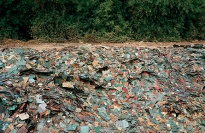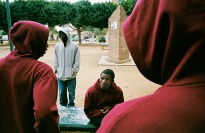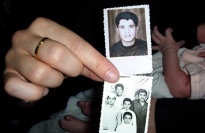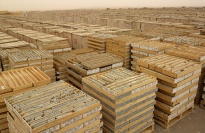About Moving Walls 13
With Moving Walls 13, the Open Society Foundations continue to support engaged photographers who strive to bring attention to underreported social issues. This year we have included two collaborative projects that use photography by amateur photographers to compelling ends. Together, the work reflects a range of approaches that reveal the human stories behind the issues at the core of the open society mission.
For the last five years, Robin Bowman has documented the lives of more than 400 teenagers across the United States, part of the largest generation of adolescents to emerge since the baby boom. Bowman’s collaborative approach to portraiture is complemented by the voices of the teenagers.
A partnership between Friends of Island Academy and the International Center of Photography focuses on an overlooked and dismissed portion of the next generation. Young women transitioning out of the criminal justice system created self-portraits that reflect their commitment to taking responsibility and becoming visible members of their communities.
Seeking the individuals behind the faceless images of Guantánamo, Margot Herster collected photographs of the detainees’ families taken by the attorneys who represent the detainees. The photographs provide the detainees with a link to their families and the public with an intimate look into their lives, reminding all of us that these are people who have a right to legal representation.
As the debate over immigration continues in the United States and in Europe, Olivier Jobard crafts a personal narrative of one Cameroonian man’s journey across half of Africa in search of a better life in Europe.
The governments of countries with economies dependent on natural resources bear considerable responsibility. They can develop the entire country, or enrich only a handful; ensure control over the country’s destiny, or make it a victim of erratic global markets. In Mongolia, as a national debate rages over how mining should—and shouldn’t—change the country, Carl De Keyzer humanizes the issue, showing how those who benefit the least from the buried treasure live.
Edward Burtynsky documents China’s economic and social transformation in massive industrial landscapes. The images reveal the considerable impact of “progress” on people who are either tiny figures in a demolished countryside or, in a factory production line, the landscape itself.
The Open Society Foundations’ Documentary Photography Project grows out of Open Society’s long history of supporting documentary photographers, most notably through the exhibition Moving Walls. More recently, the project has broadened its efforts to expose new audiences to the documentary form with an international tour of Moving Walls, and to promote the use of documentary photography as an advocacy tool by supporting photographers and nonprofits or community-based organizations to collaborate in fostering social change.





